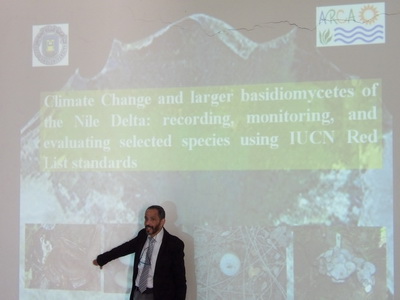

Climate change seems to be a major driver of the loss of biodiversity, and it is predicted to have an even greater impact in the decades to come. Melting Arctic sea ice, ocean acidification, warming temperatures, extreme weather events, and rising sea levels will have a devastating effect on some species. In 2002 a Convention on Biological Diversity was held in The Hague, Netherlands, to address threats to Earth’s ecosystems. Given the state of rainforest deforestation, habitat destruction, and predicted global climate change, world leaders promised to "strengthen our efforts to halt biodiversity loss, which is taking place at an alarming rate...by the year 2010."
In 2010, the International Year of Biodiversity, scientists were still talking about threats to Earth’s biodiversity. While scientists attempt to focus the world’s attention and raise awareness of the fragile state of some of Earth’s ecosystems, things are worse.
Many studies in recent years have investigated the effects of climate change on the future of biodiversity. Predicting the response of biodiversity to climate change has become an extremely active field of research carried by several investigators. Predictions play an important role in alerting scientists and decision makers to potential future risks, provide a means to bolster attribution of biological changes to climate change and can support the development of proactive strategies to reduce climate change impacts on biodiversity.
Even in the most ambitious studies, the range of species studied always represents a small percentage of known biodiversity. All studies are taxonomically biased, as they generally concentrate on a few conspicuous taxonomic groups such as plants, mammals and birds but not fungi, with a particularly strong bias towards terrestrial vs. marine biodiversity.
Why fungi are important? The fungi are a huge assemblage of organisms. Best current estimates suggest there are around 1.5 million species worldwide, of which only about 5% have so far been discovered. That means around 95% are still unknown. Fungi comprise one of the great kingdoms of biology - the others include the animals, bacteria, plants and protozoa. Fungi are totally different from all of those. They are found in all main freshwater, marine and terrestrial ecosystems. The most obvious impacts fungi have on human life are as foodstuffs (for example yeast, which is a fungus, is essential for making bread and alcoholic drinks), antibiotics (penicillin, for example, is a fungal product), and through diseases of crops and domesticated animals. But their real impact, although less obvious, is actually much greater. They are phenomenally important, providing key ecosystem services, for example as recyclers of nutrients, and without fungi life on this planet could not be sustained.
Fungal conservation: Although the wellbeing of fungi is essential for life on this planet, amazingly, up to now, they have been almost totally overlooked by all mainstream conservation movements. But the fungi have no special features which protect them from destructive human activity and climate change. Like animals and plants, they too are endangered by climate change, habitat destruction and pollution. They too need their champions to protect them.
Studies have shown that Egypt’s climate has changed greatly over the last 10,000 years, changing gradually from a wet climate (rainfall was more than 300 mm/year) to a more arid climate (less than 50 mm/year). Egypt’s Nile Delta is a globally important but critically endangered ecoregion, threatened by climate change, habitat destruction, pollution and increased salinity. Its ecosystems could not exist without fungi as symbionts and recyclers, and they face the same threats as the animals and plants, which depend on them.
Objectives of the project are to:
1-Investigate the potential long-term effect of climate change on biodiversity of macrofungi in Nile Delta, 2-Assess the effects of different disturbance frequencies, severities and sizes, 3-Assess the impacts on macrofungi phenotypic and physiological parameters, and4-Identify biodiversity hotspots at the landscape scale to facilitate conservation management.
Project Team
Climate Change and larger basidiomycetes of the Nile Delta: recording, monitoring, and evaluating selected species using IUCN Red List standards'project, involving an experienced team, aims to establish baseline information about delta fungi, effects of climate changes and for 10 selected species begin monitoring populations and evaluating their conservation status based on IUCN categories and criteria.The Principle Investigator (PI)

Department of Botany, Faculty of Science,
Suez Canal University, Ismailia, Egypt.
Co-Principal Investigator Co-PI)

Prof. Abdelghafar M. Abu-Elsaoud
Department of Botany, Faculty of Science,
Suez Canal University, Ismailia, Egypt.
Members

Department of Botany and Microbiology, Faculty of Science,
Assiut University, Assiut, Egypt.

Ms. Safaa Abdelbary
Department of Botany, Faculty of Science,Suez Canal University, Ismailia, Egypt.

Dr. Mohamed A. Abdel-Azeem
Faculty of Pharmacy and Pharmaceutical Industries,Sinai University.

Mr. Shady S. Mahmoud
Arab Society for Fungal Conservation and web designer.